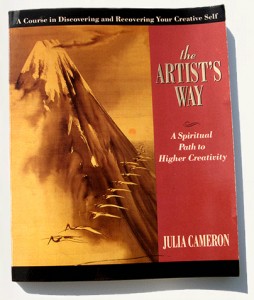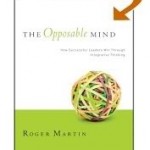Morning Pages will Boost Your Creativity
 Individual creativity or the mental ability to generate new and relevant ideas on-demand is a highly prized skill. Although creativity is not fully understood there are many proven techniques we can use to improve it. Creativity will be a frequent topic on the Next Brain Blog.
Individual creativity or the mental ability to generate new and relevant ideas on-demand is a highly prized skill. Although creativity is not fully understood there are many proven techniques we can use to improve it. Creativity will be a frequent topic on the Next Brain Blog.
A great way to get started in developing your creativity is to work through a self-paced program such as The Artist’s Way. A primary technique the book teaches is called the Morning Pages.
“Morning Pages are three pages of longhand, stream of consciousness writing, done first thing in the morning. There is no wrong way to do Morning Pages– they are not high art. They are about anything and everything that crosses your mind– and they are for your eyes only.”
Doing this teaches your brain how to flow, initially without any specific purpose. But it is the first step. Much like “just start running” would be a first step in training for a foot race.
Doing Morning Pages for at least three months should produce a noticeable change in your capacity to think creativity.
For more detail on the Morning Pages and a second technique check out Basic Tools. This is a 16-page 8.5M PDF file.
If you have been using Morning Pages or other writing-based creativity techniques please leave a comment and share your experiences and results.
Categories: Books, Problem Solving, Training Tags: creativity
Critical Reasoning Sharpens the Mind But Takes Mega Effort to Develop
 Thinking or reasoning critically is a key cognitive skill. It means we know how to question assumptions, see the logic or lack of logic in an argument, draw sound conclusions from evidence, find root concepts and causes, generate possibilities systematically, avoid decision traps and cognitive biases, see things from multiple points of view and otherwise rigorously deal with ambiguity.
Thinking or reasoning critically is a key cognitive skill. It means we know how to question assumptions, see the logic or lack of logic in an argument, draw sound conclusions from evidence, find root concepts and causes, generate possibilities systematically, avoid decision traps and cognitive biases, see things from multiple points of view and otherwise rigorously deal with ambiguity.
Critical thinking is so important that it has been a major area of focus since the time of the ancient Greek philosophers. But it is not just a philosophical thing. For example, in a recent post on the Harvard Business Review’s blog How Leaders Should Think Critically, the authors argue that it is a fundamental skill for today’s business leaders and students. Of course the same arguments apply to non-business school students and leaders as well as everyone trying to make their way in today’s complex society.
In short, enhancing critical thinking is an important option for anyone interested in building a sharper mind and will be a regular topic on this blog.
But how can you improve it? Self-study using a book or web resource is a good way. I’ll make a couple of recommendations below. You can also scout out a class or seminar at a location near you. For those who like a more guided approach, you can contract the services of a tutor or philosophical counselor.
No matter how you start please be sure to share your experiences with other readers of this blog.
For a good introductory text on critical reasoning see, Thought and Knowledge: An Introduction to Critical Reasoning. It is relatively inexpensive, easy to read and covers basic and advanced topics. It has a more psychological than philosophical orientation and provides nice chapter summaries. You can access it online on Questia here.
For a very comprehensive free treatment, check out Critical Reasoning a User’s Manual (version 3.0). It is a 640-page (3 MB) PDF. It is also available online in the document reader Scribd here.
Both these resources will take an enormous effort to get through! If you are aware of a better general introduction please comment on this post. In the meantime, I will blog on specific techniques that you can use to build critical reasoning skills with much less effort.
Categories: Ancient Ways, Books, Decision Making, Problem Solving, Training Tags: critical reasoning, critical thinking
Use Integrative Thinking to Crack Hard Problems
 There are literally dozens of methods you can use to solve problems. We will try to cover all of them in this blog. The latest crop are driven by the idea that we can become better problem solvers if we learn to think like professionals that are really good problem solvers. Makes sense. For example, in design thinking we try to think like a successful designer or in leadership thinking we try and think like a highly effective leader.
There are literally dozens of methods you can use to solve problems. We will try to cover all of them in this blog. The latest crop are driven by the idea that we can become better problem solvers if we learn to think like professionals that are really good problem solvers. Makes sense. For example, in design thinking we try to think like a successful designer or in leadership thinking we try and think like a highly effective leader.
One approach to think-like-a-leader that has worked for me comes from the Rotman School of Management at the University of Toronto. It is called integrative thinking. In essence it is:
“the ability to constructively face the tensions of opposing models, and instead of choosing one at the expense of the other, generate a creative resolution of the tension in the form of a new model that contains elements of the individual models, but is superior to each. “
Easy to say but hard to do. The payoff however can be enormous as this often used quote by F. Scott Fitzgerald suggests:
“The test of a first-rate intelligence is the ability to hold two opposing ideas in mind at the same time and still retain the ability to function”
In the language of this blog integrative thinking is an important option for building Your Next Brain!
 To dig deeper check out the book, The Opposable Mind: How Successful Leaders Win Through Integrative Thinking. You can get a free preview of the book here. Or if you have more money to spend and want some personal training consider the 3-day executive program in Toronto this April. I will blog on my experiences later. Meanwhile please share your ideas and experiences with integrative thinking techniques.
To dig deeper check out the book, The Opposable Mind: How Successful Leaders Win Through Integrative Thinking. You can get a free preview of the book here. Or if you have more money to spend and want some personal training consider the 3-day executive program in Toronto this April. I will blog on my experiences later. Meanwhile please share your ideas and experiences with integrative thinking techniques.
Categories: Books, Decision Making, Executive, Leader, Problem Solving, Training Tags: cognitive dissonance, integrative thinking
